Loss of extension after ACL surgery: How to assess for a cyclops lesion
Loss of extension after an ACL reconstruction can be debilitating for the patient. It’s not as common as you would think but I see it enough in the clinic from people that are months out from surgery. Usually, this loss of knee extension after an ACL reconstruction is caused by a cyclops lesion. Let’s dive deeper into this!
Often times, they’ll present with anterior knee pain, posterior knee soreness and a relatively weakened quadriceps muscle that just won’t return. No matter what they do to get the motion back, the knee just never feels normal.
I’ve written about the loss of extension after an ACL reconstruction in the past. In this post, I discussed how I like to work on knee extension immediately after an ACL surgery. There are a few ways that I think are most effective and with minimal patient efforts.
What is a Cyclops Lesion?
For those not familiar, a cyclops lesion is a wad of scar tissue in the anterior aspect of the knee joint. It is believed to be a remnant of the previous ACL stump that had remained during the reconstruction surgery. At least that’s one theory. Another theory states that it may be fibrocartilage as a result of drilling the tibial tunnels.
Whatever the case, this arthrofibrosis (scar tissue) physically blocks the knee joint from locking out into full extension. Check out this MRI that shows the scar tissue in the anterior knee.
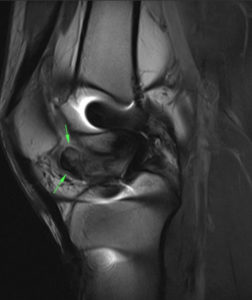
Cyclops lesion in the anterior knee blocking full (hyper) extension
How do I assess for a cyclops lesion after ACL surgery?
In this video, I describe why and how I assess for a cyclops lesion. Check it out.
Is it a Cyclops lesion or just a tight knee?
From the video, you can clearly note that anterior pain, in my experiences, is most often related to a cyclops lesion. Other factors to consider include:
- temporary/transient gains in extension
- anterior knee pain after increasing activity
- poor patella mobility
- quads just won’t come back
- continued hamstring/calf soreness
These are tell-tale signs that there’s more going on and you should refer back to the doctor so they can order an MRI to rule in/out the anterior scarring. If diagnosed, the best (and only) option is to have a knee scope and remove that scar tissue.
There’s nothing else that can be done. No PT, injections or manual therapy can restore full symmetrical knee extension.
The scar tissue needs to be removed by surgical excision. Aggressive PT should commence immediately after surgery to restore the extension range of motion.
The Best and Easiest Way to Restore Knee Extension after an ACL
Rehab after an ACL is never easy. There are many things that could affect a patient’s outcome. I’ve treated hundreds of patients after an ACL reconstruction and each one is a unique challenge. I wrote about this in a previous post here..check it out and let me know what you think.
I put this video together for Mike Reinold’s website so you could see what I exactly do to gain knee extension back….and why I’m not a fan of prone hangs. Hope it helps with some of your knee patients.
Final Cyclops Thoughts
As a PT or athletic trainer, don’t blame yourself if the patient needs another surgery to remove the scarring. It seems as if it was inevitable and was going to occur no matter the efforts to work on knee extension. I think the lesson here is:
- work on extension early and often
- maintain good compliance at home
- assess/measure each visit to determine gains or losses
- early patella mobility and knee PROM
- get the pain and swelling out as quickly as possible
- refer back to the doctor if the ROM not improving despite your best efforts
Hope this post helps you get better outcomes for your ACL patients!

If you want to learn more about how I treat ACL’s, then you can check out our all online knee seminar. If interested, check it out at www.onlinekneeseminar.com and let me know what you think. We cover the anatomy, rehab prescription, ACL, knee replacements and patellofemoral issues both non-operative treatment and post-operative treatment. This is an awesome course if you’re interested in learning more about rehabilitating the knee joint. And if you’re a PT, there’s a good chance you can get CEU’s as well.

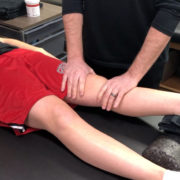
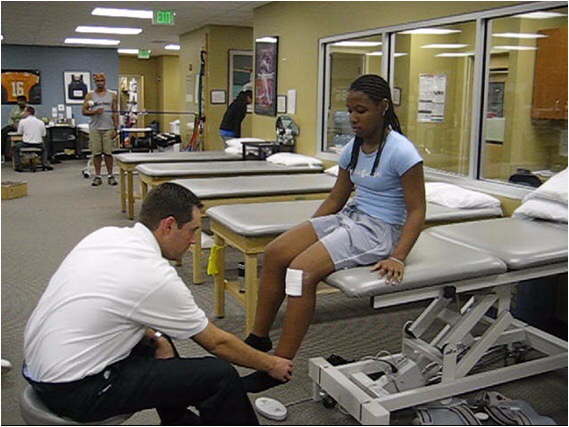
 https://pixabay.com/illustrations/new-year-s-day-beginning-start-2566661/
https://pixabay.com/illustrations/new-year-s-day-beginning-start-2566661/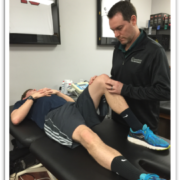
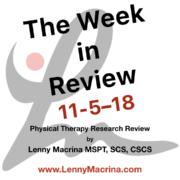
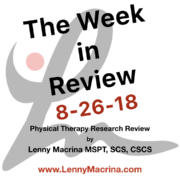



Lenny,
Assuming you get the patient within a week or 2 post op, how long do you usually work on extension for before considering contacting the surgeon with your concern?
I usually monitor for 6 weeks or so. If the endfeel is firm and the pain is in front of the knee with overpressure, then I inform the doc that we may have an issue. No later than 10-12 weeks. That make sense?
I had an ACL replacement + meniscus repair done in 1 surgery. 6 months later and despite the continuous PT i can’t have hyperextension of my knee and i feel its locked at certain range of extension.
After a 2nd MRI it looks like i have an early Cyclops lesion which may explain why i can’t acheive full extension.
I have 2 questions: is surgery to remove the Cyclops leasion manfayory or can agressive PT take care of it. My 1st surgery was not the nicest thing to live so I wonder if i have to go back to surgery again.
2nd, why does the Cyclops lesion form knowing that everything was cleaned in my knee during the 1st surgery. Is it something that can reappear again with time?
Thanks for the question Meriem and sorry that your knee is still not right. In my experience, you will need surgery but it is a lot less involved and painful than the ACL surgery. It is just a scope surgery and you should start PT the very next day.
As for why Cyclops lesions occur… we do not 100% know but it may be a remnant if your old ACL stump that develops scarring. Good luck!
Di you get the surgery done to remove cyclops? If so, how was the pain or recovery compared to the original ACL surgery?
I’ll let Meriem reply on their own but typically the surgery is not that painful and much quicker recovery than the ACL reconstruction. It’s only arthroscopic so there’s much less tissue involvement.
Lenney, appreciate your quick response.
I had an ACL reconstruction surgery almost 3 years ago and since suffered with a stiff knee and loss of extension. I have tried a lot of physio but nothing seemed to work. Recent MRI shows cyclops lesion that is blocking my knee. I also have hyper extension in my other knee.
My questions:
1. My knee gets really stiff and painful when I try running or playing sports. I start to limp due to I further loss of extension after playing or running. Does this sound typical case of cyclops lesion?
2. How long does it take to get full extension after cyclops removal and what is a typical recovery time?
Thanks!
your symptoms sound typical of a cyclops lesion but because you’ve had it for so long it may be difficult to regain your mobility as quickly as normal. It will take a lot of work but itis possible. It will take weeks to months to get most of it back but this is your best chance to feel better long term. Good luck!
Hi! I’m almost 7 months ACL post-op. Even though it’s pretty painful, I can get full extension at physical therapy but after about 10-15 minutes or so it goes back to being stiff and bent. I’ve never been able to bend it very far… only a little more than 90 degrees and it hurts the inside of my knee. Also after a workout it stiffens up a lot. I haven’t built up any quad muscle since my surgery either. I have an appointment with my surgeon approaching to get an MRI, but I was wondering if you thought this may be a cyclops lesion?
Hi Jordyn, sorry to hear about your injury. If you are 7 months out of an ACL reconstruction and are struggling to maintain your full extension and only bending your knee to 90 degrees then you are certainly behind normal rehab. At this point, you should have full motion and solely working on strength training. Without doing an exam on you, it sounds like you may have some form of general scarring in there and I wouldn’t be surprised if you had a cyclops lesion. This would require surgery but I think that would be a good thing for you and give you much relief within a few weeks. The MRI and physical exam by the doc should clarify a bunch soon. Stay positive and know that there is still hope for improvement with further interventions. Good luck!
Is surgical intervention usual the course of management for cyclops leison? Thanks!
Yes Steve, surgery is recommended. That wad of scar tissue needs to be excised. That will help restore full knee extension. PT can also be used to help regain the lost extension and restore the remaining strength.
My daughter is 8 weeks post OP and has yet to gain full extension..how would the surgical removal of scar tissue effect her playing sports
If truly a cyclops lesion, then could affect her ability to get her knee straight and limit quadriceps strength long term. Also may put more stress on the front of the knee and cause anterior knee pain. I’d suggest talking to your PT and surgeon to figure out a game plan and maybe consider a knee scope to clean out the scar tissue, which would help regain her motion. Probably a scenario that will play out over the next few weeks but need to get symmetrical knee extension in order for her to feel her best long term. Good luck!
What is the recovery time for an athlete following scope for a cyclops lesion?
Hi Gina, seems like most take at least a month to recover but often longer to really feel normal and get their motion back and full strength. I usually tell my clients to add 3-6 months to the recovery process. Good luck!
Can my son start practicing basketball
After a month of having the
Cyclops procedure?
I would leave that up to his PT or ATC but may be a bit quick, in my opinion. Good luck!
Thank you very much for replying. Feel so terribly for my son. It’s been a bumpy road for him. Sport is his life…. he had ACL, MCL meniscus repair 10 months ago and the pain hasn’t let him play fully sports. He’s a senior in high school and feels he lost his chance on getting scouted by Colleges
tough one but keep working at it. If you’re good enough then colleges will def consider you.
What are symptoms of cyclop lesion
as the blog post mentions, pain in the front of the knee with full knee extension and the inability to achieve full extension ROM even after working on it for several PT sessions. Seek a PT who can help you further assess and treat, if you are struggling. Good luck!
Thank you for replying, i had my acl recon and L/meniscus repair 3 months ago. I cant full extend my knee (3-6 deg.) And flex (90- 95 deg) only, with stiff and pain as well. And my question is, can you get full knee extension and flex immediately after removal of cyclop lesion?
sounds like your ROM is somewhat behind in general. At this point, you should have full ROM. Tough to tell if you have a cyclops lesion or just general stiffness caused by scarring and pain. I’d consult with your doctor to determine the difference via an exam and maybe an MRI. If surgery is needed, then you’ll still need time to get the ROM back (no, itis not immediate) and will be a process. Good luck
I’m 3 months 2 weeks post op (BTB Patellar Tendon ACLR). I’ve had an incredibly fast recovery and have had full extension and have been able to touch my heel to my butt a month after surgery. Lately my knee cap has been doing weird stuff and my surgeon diagnosed me with a cyclops lesion, told me if it didnt get better within the next month he would give me a injection. Will that help? I noticed online everyone is saying they need surgery to make this go away. I have full mobility but my knee is very crunchy (usually in the mornings) and cracks sometimes, most the time it isn’t followed by pain, but sometimes there is a sharp pain.
typically a cyclops lesion will block the range of motion, especially extension. If you do not have symmetrical extension similar to your other knee then you may have a cyclops lesion. Did the doctor do an MRI? If not, you may want to ask for one before you have a second surgery. Crunching and cracking (pain free, hopefully) in the knee is very normal after an ACL. You’re only 3+ months post-surgery so there’s still a lot more strength to be gained over the next 6+ months.
Hi, its been 7 months since my 2nd ACL reconstruction. I have been having a lot of clunk sounds when I extend my knee. I had my MRI done last week and it didn’t show any evidence of Cylops Lesion but the my doctor thinks that it is Cyclops Lesion and said that he has to go inside my knee to trim it off. I am just scared since it didn’t show up in the MRI, how can the Dr be so sure about it? Also I have done really aggressive PT which didn’t help me with the clunk sounds but only increased it. I am just confused now. I just don’t know what to even ask the Dr in this situation. Please advise.
sorry to hear and hope you can get through this. Sometimes a cyclops lesion can make a clunk sound but often it is just a normal noise observed after the surgery. Are you lacking knee extension? Can you get it as straight as the other knee? That would be the key fact to determine if you truly have a cyclops lesion. If surgery is needed, it is much easier than the ACL surgery and should only set you back a couple weeks. Good luck!
Yes, I can get the knee straight as the other leg. Also with the Cyclops Lesion – does the knee get weaker as time passes? I am starting to feel the clunk sound every time I walk, when I sit in a chair and when I get up.
Knee gets weaker by not using it and not building strength. If you can lock it out straight exactly the same as the other knee it doesn’t sound like a cyclops lesion. Sounds more like a muscle weakness issue and patella tracking issue. Hope this helps and good luck.